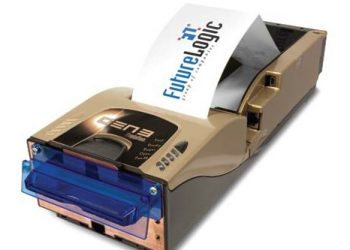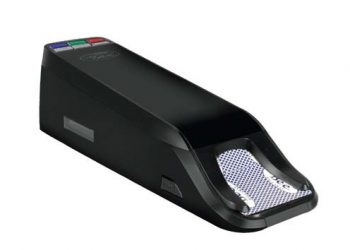Scott McCarthy is using his operational experience in Macau casino management to help develop GPI’s Asian business
Gaming Partners International Corporation (GPI)—one of the world’s leading manufacturers and suppliers of casino currency and table games equipment—recently appointed Scott McCarthy as Vice President of Sales, Asia. Mr McCarthy is in charge of the company’s expanding operations throughout the Asia Pacific region. He’s also responsible for the region’s sales and service functions and will oversee the company’s Asia employee base.
Scott McCarthy has detailed knowledge of the casino currency and casino technology market from the viewpoint of an operator. His previous job was as Director of Cage and Count for Melco Crown Entertainment’s City of Dreams (CoD) resort in Macau. There, he was responsible for overseeing the casino’s cash and chip flow operations and worked closely with executive management to ensure that the property’s cage and count operations were in accordance with overall business objectives and earnings targets.
Mr McCarthy has more than 15 years’ experience in cage currency operations, including an extensive background in VIP junket operations. He was involved in the opening of MPEL’s VIP-focused casino hotel Altira (formerly Crown Macau) as cage manager. Prior to moving to Macau, Mr McCarthy worked for Crown Casino in Melbourne, Australia.
“Scott’s expertise in casino currency operations and management and his depth of experience in casino RFID [radio frequency identification security tag] implementation will be a tremendous asset,” said Gregory Gronau, GPI’s President and Chief Executive Officer, on welcoming him to the company.
“His experience will especially count as we leverage our Chip Inventory System (CIS) and other RFID products in new and exciting ways to support the casino currency tracking needs of our valued customers,” added Mr Gronau.
Inside Asian Gaming caught up with Scott McCarthy to talk about his new role and his thoughts on developing GPI’s already strong business in Asia.
IAG: Some of the best advisers on casino security are said to be excons. Of course, you’re one of the good guys, but how important is your experience of casino cage operations management in Macau in helping to develop GPI’s security products business in Asia?
Scott McCarthy: Having an industry-related operational background does give me a unique perspective on GPI’s core currency and its security-focused products. l am aware of the challenges facing casinos today with respect to casino currency— whether it be in the form of chips, plaques or cash.
I see my operational experience as a tremendous asset in shaping future product development priorities with GPI. It’s a real chance to help drive product development that focuses not just on security features but also on supporting product integration through a detailed understanding of a casino’s needs. I see a real opportunity to harness the power of GPI’s CIS version 2.0 and to create operational solutions/synergies for the cage, table games, asset protection and premium programme play as well as junkets, marketing and statistic analysis.
Please give practical examples of things you’ve encountered in your time in casino operations and how that can be fed into GPI’s product development and decision-making process.
Managing a casino day-to-day gives you a detailed understanding of not only how things run but how operations can be improved and further efficiencies realised. When you’re involved in that operations side you know you need the support and understanding of the companies supplying your technology to realise those further efficiencies. My insight on that can assist GPI in building its strategic partnerships with customers and making sure we respond to the casinos’ operational realities.
Anything and everything that we currently do with chips can be further extended and developed. Through RFID technology we have not only enhanced security features, but we’ve also provided a basis for automating functions that are traditionally manual—and painstakingly so—such as checking casino currency inventory.
I also understand that having a multi-property operation—in the manner of some of the Macau concessionaires and sub-concessionaires—is a challenge. Players move between properties, for example. In that situation we want to give our customers’ players the flexibility to move currency between properties without any compromising of security. That’s where yet again RFID comes into its own. It gives operators confidence that chips are uniquely identified as belonging to them. RFID tagging also means the chips carry a record of where and when they were won or purchased. It’s a system that allows you to know where your inventory is, across multiple sites. It also allows you to manage your par levels [indicators of inventory, such as when a chip tray may need filling]; and track nonsensical or suspicious movements in real time. That’s where we’re heading at GPI with RFID and CIS 2.0.
Having insight into how casino budgets work with regard to procurement is also an advantage. This will enable us to understand budgetary constraints and work with companies on solutions like finance or lease planning.
Most of the existing junket and player programmes still have quite a few manual components. Administering these components can expose the operator to risk—risk that the player will have a bad experience with customer service, or a risk that some human error will come into the process. RFID has the ability to change all that. Again, it’s as simple as A to B. We can use API—application programming interface—in conjunction with RFID to achieve bespoke solutions for properties.
What’s your strategy or set of strategies for building GPI’s revenues in Asian markets?
Customer support—building on the existing relationships we have, and as I said combining real gaming industry experience with a vision for how we can better support casinos’ needs in the future. A key focus will be establishing solid collaborative relationships with all the region’s operators.
Hardware warranties—our hardware will be fully supported for the whole of its operational life.
Leasing models—working with our partners on leasing models to assist them in getting RFID onto their gaming tables.
Product expansion—GPI currently provides a long list of casino-related products which have been in the market place for quite a long time in the US. They include table layouts, cards, dice, and an extensive range of table furniture. I would like to leverage our experience from the US and introduce these premium products into the Australasian market, for example.
What are the challenges as well as benefits of inheriting sales regions where you have a dominating market share in key product categories?
When you represent such a prestigious brand as GPI, there are substantial expectations from the market—and rightly so. That challenge can be met by me personally by drawing on my previous experience and enthusiasm for the products that GPI produces. I think that will bring a dynamic and diverse edge to our support offering.
The benefits of excellent market coverage include: the depth of knowledge that the GPI group brings to the table; an unsurpassed reputation for quality and reliability; GPI’s ability to bring together crucial elements from throughout their product range; being able to leverage GPI’s strategic partnerships; and being part of a company with vision, leadership, passion, and partnerships enabling it to achieve ‘best in industry’ outcomes.
What do you think will be the main trends in terms of product development and regional sales of casino security equipment and peripherals in the next few years?
I see more and more operators embracing RFID as a total casino currency solution rather than just a counterfeit currency verification instrument. I know that in the past RFID promised to deliver so much more than it was capable of delivering at the time. This hampered the technology’s application in gaming and its wide scale adoption in the industry. That’s changed now. RFID has truly landed on its feet with GPI. This company is fully committed to making sure that RFID is developed to its full potential, and that potential is vast.
CIS 2.0—which will very soon be ready for release—is the first major step that RFID development has taken in quite some time. The acquisition, development and broader application of the technology has been spearheaded by Gregory Gronau along with Emmanuel Gelinotte, Vice President of Global Research & Development, and Kirsten Clark, Vice President of Global Marketing & Product Management. I am very excited to be part of this team that GPI have put together.
I myself have worked operationally with RFID technology for over five years now. To see the direction that RFID is taking is something that l am very proud to be a part of. The synergies and streamlining efficiencies that RFID holds for casino operators around the world is truly invaluable. CIS 2.0 and beyond through direct connectivity to the Casino Management System (CMS) will enable the operator to gather data in real time; and have dual-level float trays that record and track every chip movement during live game play. It will also allow measurement of table drop; table play optimisation and overall property performance optimisation; real time tracking; and limitless possibilities to harness live data. That will be to the benefit of every department involved in making a casino operation not only successful, but also making sure that it is running at its optimal performance level.
On the subject of Macau’s gaming table caps, with the RFID suite, operators will be able to automate manual tasks that slow down productivity. Imagine being able to increase your hands per hour by not having to stop a game for fills and credits, and streamlining the buy-in process to a fraction of the time it currently takes. You’ll be able to automate player programme functions like table rolling, and increase customer service so that everything that happens on the table is in real time with no delays. If you can monitor every location in real time, that’s a tremendous security feature for your security and surveillance departments.
I also see the market moving more towards bespoke five-, six-, and seven-shot [dye injection] chips with greatly increased security features. Casino chips will be seen as more than just a currency, they will themselves become part of a property’s branding proposition. Look at junkets in Macau, they are moving more and more into advertising, publications, billboards, branded transportation and clothing. Why not have bespoke casino currency—chips, plaques and jetons—with junket branding?
We saw at G2E Asia the increasing role of portable security technology such as GPI’s portable chip authenticator. From your experience of operations, can you tell us why that is?
This is a very important step towards achieving a total RFID solution; RFID needs to be embedded into every facet of the casino currency and operation; every cage, treasury, chip bank and gaming table should have the support of an RFID authenticator. The portable chip authenticator is a solution that enables operators to achieve an at-the-pit verification in real time. It gives flexibility through its portability. You can take the authenticator to the table as opposed to having to bring the table inventory to you. That’s a great step forward towards achieving a permanent table solution, which of course we now have through our RFID float trays and table top authenticators.































